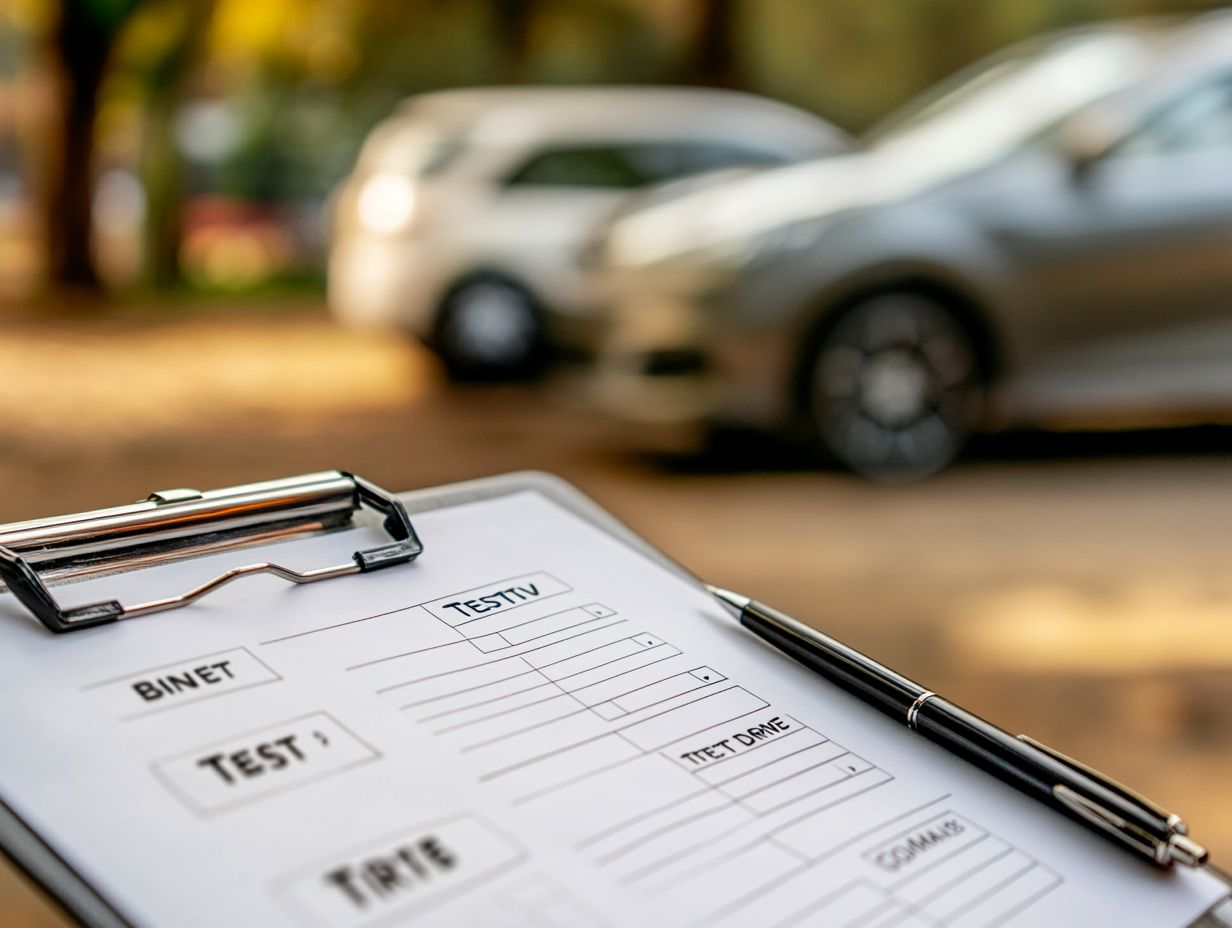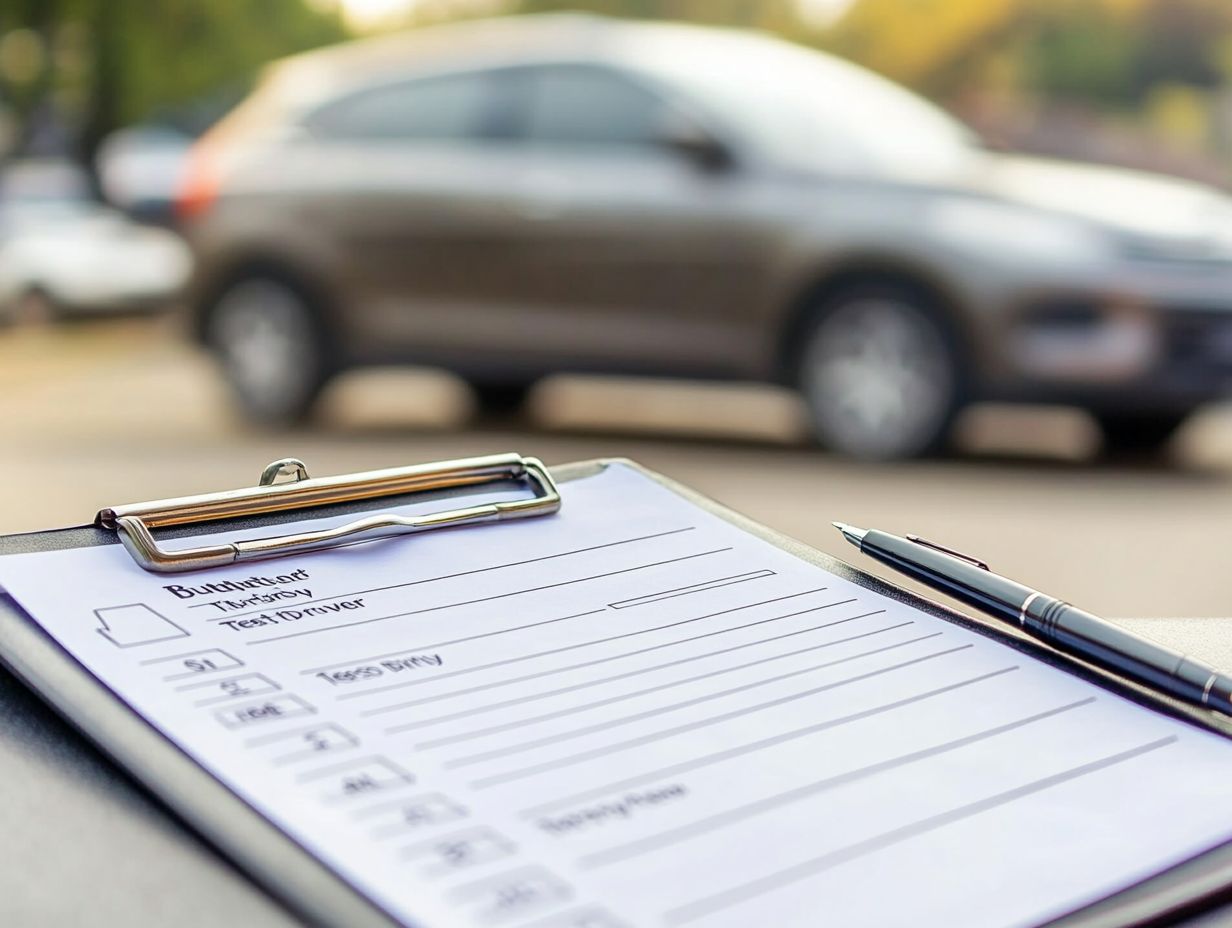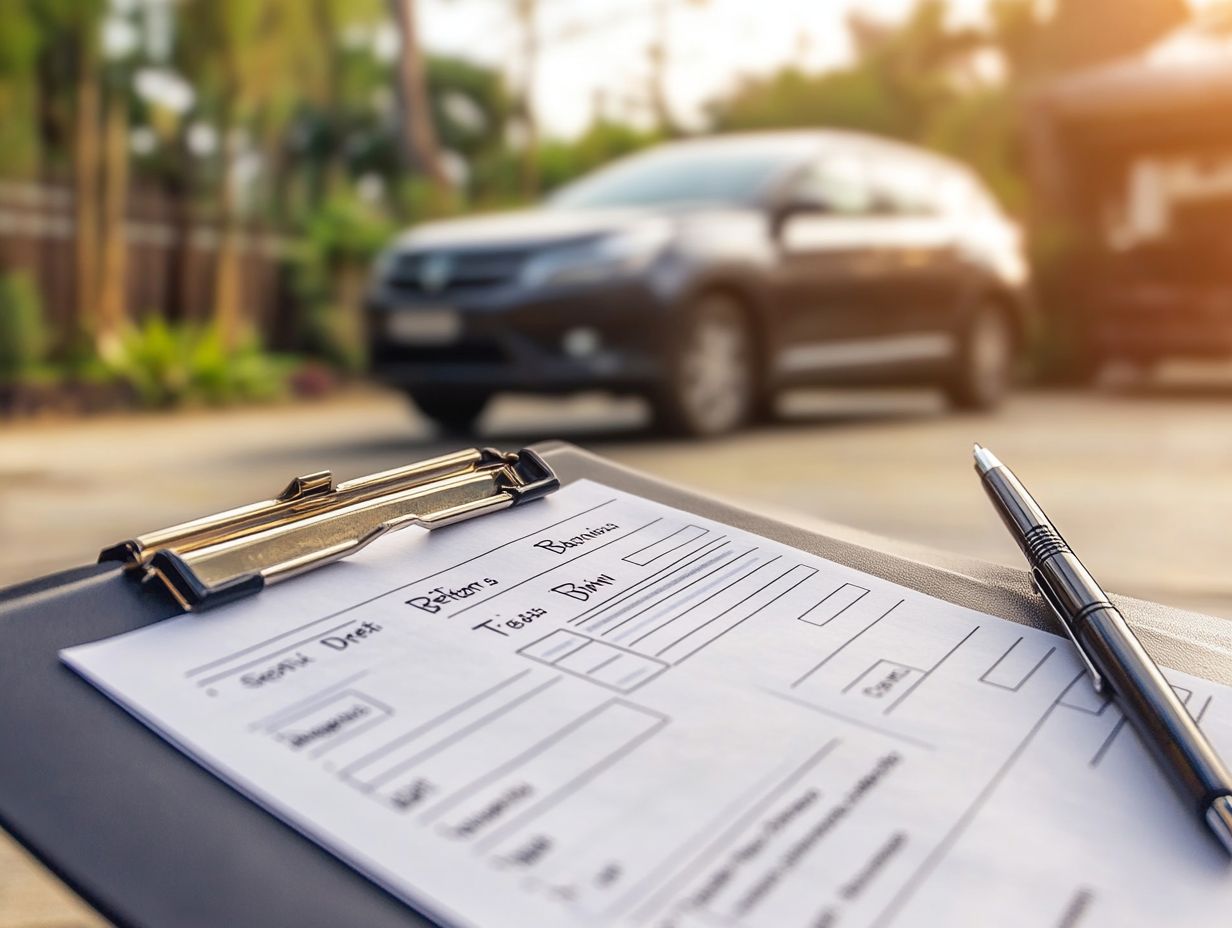Checklist for Buying a New Car: What to Know
Buying a new car is an exciting adventure! But it can also feel overwhelming. With a myriad of options and factors to consider, it s crucial to tackle this significant investment with a carefully crafted plan.
From establishing your budget to grasping the latest features and technology, this comprehensive checklist will guide you through each vital step. You’ll explore everything from researching various car models and reviewing safety ratings to mastering the art of negotiating the best price.
By the time you reach the end of this journey, you ll be equipped to make a well-informed decision that aligns perfectly with your needs and lifestyle.
Contents
- Key Takeaways:
- 1. Determine Your Budget
- 2. Research Different Car Models
- 3. Consider Your Needs and Lifestyle
- 4. Check for Available Discounts and Incentives
- 5. Test Drive the Car
- 6. Research the Car’s Safety Ratings
- 7. Consider Fuel Efficiency
- 8. Research the Car’s Maintenance Costs
- 9. Check for Warranty Coverage
- 10. Research the Car’s Resale Value
- 11. Consider Insurance Costs
- 12. Research the Car’s Reliability
- 13. Check for Recalls or Safety Issues
- 14. Consider the Car’s Features and Technology
- 15. Negotiate the Price and Finalize the Purchase
- What Are the Benefits of Buying a New Car?
- Frequently Asked Questions
- What should I consider when making a checklist for buying a new car?
- What should be included in a checklist for buying a new car?
- How important is it to set a budget when buying a new car?
- Why is it necessary to test drive a car before buying it?
- How can I ensure I am getting a good deal when buying a new car?
- Do I need to consider the car’s safety ratings when making a checklist for buying a new car?
Key Takeaways:

- Set a budget and stick to it to avoid overspending.
- Research different car models to find one that meets your needs.
- Look at safety ratings, fuel efficiency, and maintenance costs before buying.
1. Determine Your Budget
Determining your budget is a crucial first step in the car-buying journey. It sets the stage for informed decisions about financing options, total cost of ownership, and evaluating monthly payments that fit comfortably within your financial means. Additionally, consider reading about how to prepare for new car ownership to ensure you cover all necessary aspects. Don’t forget to consider how your credit score can impact your potential loan terms.
Embracing various budgeting techniques can significantly enhance your experience when purchasing a vehicle. For example, using an auto loan calculator allows you to grasp monthly payments based on different loan terms and interest rates, enabling you to plan your finances intelligently.
It’s essential to take the total cost of ownership into account. This means considering all expenses beyond just the buying price, like insurance, maintenance, and depreciation.
Explore dealership financing options that might reveal attractive rates. Negotiate the trade-in value to positively impact your overall budget; a favorable trade-in deal can lower the price of your new vehicle, making the entire process much more manageable.
2. Research Different Car Models
Exploring different car models is crucial for you to find a vehicle that perfectly aligns with your needs and preferences. Resources like Kelley Blue Book, Edmunds, and Autotrader offer invaluable insights into popular choices such as Hyundai, Toyota, Honda, Kia Sedona, and Nissan Quest.
By dedicating time to research these models, you can uncover essential information about various features that enhance both comfort and safety, along with performance metrics that significantly influence your driving experience. Evaluating reliability reports will serve you well in selecting a dependable vehicle that withstands the test of time.
For example, a comparison between the Honda Accord and Toyota Camry may reveal subtle differences in fuel efficiency and interior design that ultimately lead you to make a more informed decision.
Platforms like Autotrader enable you to filter options based on your specific criteria, ensuring you not only find the best-priced choices but also the models that truly resonate with your lifestyle.
3. Consider Your Needs and Lifestyle
Considering your unique needs and lifestyle is essential when selecting a new car. Factors like comfortable seating, safety feature comparisons, and your long-term vision for ownership can significantly shape your final decision in the automotive landscape. To ensure a smart choice, it’s crucial to understand how to prepare for buying a used car.
Your family size plays a pivotal role in this process; larger families often require spacious interiors and additional seating options, while those who commute long distances may find fuel efficiency and reliability to be top priorities.
Your driving habits whether you frequently navigate urban streets or embark on rural drives will also steer you toward the ideal vehicle type, be it a compact or an SUV.
It s crucial to evaluate the importance of comfort and safety features, such as adjustable seating, modern infotainment systems, and advanced driver-assistance technologies. These elements not only elevate your driving experience but also provide peace of mind on every journey you undertake.
Don t wait! Start your planning today to make the best investment for your future.
Follow this checklist, and you’ll be ready to drive off with confidence in your new car!
4. Check for Available Discounts and Incentives
Before you finalize your purchase, it s crucial to scout for available discounts and incentives, like rebates, that can significantly lower the cost of your new vehicle. Explore dealership financing options, as these can provide a strategic edge in your trade-in negotiations.
Look for dealership promotions that can lead to impressive savings. These limited-time offers often come with perks such as cash back, low-interest financing, or even complimentary maintenance services.
By tapping into these discounts alongside your trade-in negotiations, you can maximize your overall savings. Knowing what’s available strengthens your negotiating power and ensures you re making a well-informed financial decision that aligns with your budget and lifestyle.
5. Test Drive the Car
A test drive is essential in your car-buying journey. It allows you to assess the comfort of the seats, evaluate the vehicle’s performance, and experience safety features firsthand. This step ensures that the car meets your expectations.
During your test drive, pay close attention to how the vehicle handles different road conditions. Notice its acceleration, braking, and cornering capabilities. It’s also vital to consider the visibility from the windows and mirrors, as this impacts your overall driving confidence.
If the car boasts advanced technology features, explore the infotainment system and any driver-assistance tools. Assess their ease of use and intuitiveness. Don t overlook a thorough evaluation of safety features like airbags, stability control, and collision warning systems. These elements are crucial for the protection of both you and your passengers.
6. Research the Car’s Safety Ratings
Researching a car’s safety ratings from reliable sources like the National Highway Traffic Safety Administration and Consumer Reports gives you insights into the vehicle s crash test performance. This knowledge helps you understand how safe the car is in various driving situations.
By examining these ratings, you can gauge how well the vehicle handles different crash scenarios, including frontal, side, and rollover tests. Pay attention to advanced safety technologies like automatic emergency braking, lane departure warnings, and adaptive cruise control. These features can significantly enhance your peace of mind while driving.
Knowing these ratings helps you make better choices. With the right information, you can prioritize your safety and that of your passengers. This knowledge enables you to choose a vehicle that embodies reliability and protection.
7. Consider Fuel Efficiency

Considering fuel efficiency is essential when selecting your new car, as it directly impacts your total cost of ownership, including both fuel expenses and your environmental footprint over time.
When evaluating fuel efficiency ratings, take a closer look at the miles per gallon (MPG) figures provided by manufacturers. These numbers can fluctuate significantly based on driving conditions and how well the vehicle is maintained. Understanding these figures helps you anticipate how frequently you ll need to refuel, giving you a clearer picture of your annual gas expenditures. Those initial savings at the pump can snowball into significant long-term financial advantages.
A fuel-efficient vehicle not only tends to have lower operational costs but also often enjoys increased resale value and potential tax incentives. This makes it a savvy investment for anyone keen on saving money over the long haul.
8. Research the Car’s Maintenance Costs
Researching a car’s maintenance costs is vital for understanding the overall cost of ownership and ensuring that the vehicle fits comfortably within your budget.
This knowledge helps you avoid unexpected financial burdens and make well-informed decisions. Factors influencing maintenance expenses include the make and model of the vehicle, its age, and the frequency of necessary services.
Regional variations in labor costs and the price of parts can also impact overall maintenance expenses. Analyzing these components allows you to align your purchasing choices with your long-term financial planning. This thoughtful approach leads to a fulfilling and rewarding ownership experience.
9. Check for Warranty Coverage
Checking for warranty coverage is essential during your car-buying journey. It safeguards your investment and provides peace of mind during the initial years of ownership.
Understanding the different types of warranties from manufacturers is equally vital. Basic warranties usually cover your vehicle for a specified time or mileage, addressing defects in materials or workmanship. Powertrain warranties (which cover critical components like the engine and transmission) protect vital systems from unexpected failures.
If you want long-term reassurance, consider purchasing extended warranties for more comprehensive coverage beyond the standard period. Extended warranties help relieve the burden of unexpected repair costs, allowing you to enjoy your driving experience without the weight of financial stress.
10. Research the Car’s Resale Value
Researching a car’s resale value is crucial in the automotive landscape, as it shapes your long-term financial strategy and affects how much you might recoup when selling or trading in your vehicle.
Using tools like Kelley Blue Book provides insights into the market, helping you determine a vehicle’s potential resale value based on its make, model, year, and condition. Factors such as mileage, overall upkeep, and market demand significantly impact this valuation process.
By understanding these dynamics, you can make a more informed purchasing decision, ensuring you select a car that meets your needs and retains its value over time. Considering resale value is essential for a wise car-buying experience and sets the stage for potential financial benefits down the road.
11. Consider Insurance Costs
When purchasing a new car, don t overlook the impact of insurance costs on the total cost of ownership. Premiums can fluctuate significantly based on the type of vehicle, its model, and your individual driver profile.
For example, cars with higher safety ratings often benefit from lower premiums due to their reduced risk of injury and damage in accidents. The type of vehicle you choose whether a compact car or a luxury SUV also plays a major role in determining insurance costs, with more powerful engines typically attracting higher rates. Your driving history also matters; a clean record can lead to more favorable rates.
Therefore, it s crucial to gather multiple insurance quotes before finalizing your car purchase. Collecting these quotes can save you money and provide peace of mind before buying your new vehicle!
12. Research the Car’s Reliability
Researching a car’s reliability is key for making a sound purchase decision. Resources like Consumer Reports provide insights into historical performance and potential issues.
Along with expert reviews, explore user feedback from forums and owner surveys; these often reveal real-world experiences that can be enlightening. Look for key indicators such as engine performance ratings, repair frequency, and parts availability to assess long-term dependability.
Evaluating warranty options is also wise, showcasing the manufacturer’s confidence in their product and providing added peace of mind. Ultimately, choosing a reliable vehicle enhances your daily convenience and instills a sense of security, knowing you re opting for a choice built to withstand the test of time.
13. Check for Recalls or Safety Issues
Checking for recalls or safety issues is essential in your car-buying journey. It ensures you re fully informed about any potential problems that could impact your safety and the vehicle s performance.
To uncover this crucial information, the National Highway Traffic Safety Administration (NHTSA) is an invaluable resource. Visit their website to easily search for recalls tied to specific makes and models. This can save you from investing in a vehicle that may pose risks on the road.
Addressing identified safety concerns before finalizing your purchase safeguards your well-being and grants you peace of mind. Remember, an informed buyer is a responsible buyer. Prioritize your safety by taking these extra steps.
14. Consider the Car’s Features and Technology

When you re in the market for a new car, consider the features and technology that elevate comfort, convenience, and safety. These elements can profoundly shape your overall driving experience.
Comfortable seats are essential for reducing fatigue during long journeys. An intuitive car entertainment system keeps you connected with vital navigation tools, music options, and hands-free communication.
Don t overlook advanced safety features such as adaptive cruise control, a system that automatically adjusts your speed based on the vehicle in front of you, and lane assistance technology. They protect everyone on the road occupants and pedestrians alike.
Embracing these innovations creates a driving environment that prioritizes relaxation, connectivity, and security. Transform your daily commute into an enjoyable adventure.
15. Negotiate the Price and Finalize the Purchase
Negotiating the price and finalizing your purchase is a critical step in securing the best deal possible. Leverage any available incentives or rebates to maximize your savings.
Equip yourself with detailed knowledge of market value pricing to enhance your bargaining power. Conduct thorough research before discussing prices with dealers. Analyze similar transactions and utilize online pricing tools to establish a solid baseline.
Understanding the trade-in value of your current vehicle is vital for crafting a comprehensive negotiation strategy. Inquire about special finance rates or leasing incentives to further reduce your overall costs. Get ready to secure the best deal!
What Are the Benefits of Buying a New Car?
Buying a new car opens doors to incredible advantages! Enjoy the peace of mind that comes with a vehicle under warranty and access to the latest technological advancements.
Experience enhanced reliability as new cars meet today s safety and performance standards. They also offer a plethora of customization options, allowing you to tailor your vehicle to your tastes, whether it s selecting luxurious materials or incorporating advanced safety features.
These enhancements enrich your driving experience and bolster overall safety on the road. Cutting-edge technology can help prevent accidents and alleviate driving stress. Investing in a new car elevates your comfort and security, promising a smoother ride for years to come.
What Are the Possible Drawbacks of Buying a New Car?
While purchasing a new car has its benefits, it’s essential to consider the potential downsides. These include higher upfront costs, rapid depreciation, and the challenges of negotiating the purchase price. For a comprehensive look at the process, check out the ultimate guide to buying a new car.
You might not realize that a new vehicle can lose a significant portion of its value in just the first few years sometimes as much as 20% in the first year alone. This quick drop in value can hurt your finances over time, so it’s vital to balance the immediate thrill of driving a new car with its long-term economic implications.
The costs of insurance, maintenance, and potential repairs can strain your finances further. Understanding the complete financial picture is necessary for making informed decisions about vehicle ownership.
What Are the Alternatives to Buying a New Car?
Exploring alternatives to buying a new car opens a world of possibilities, especially if you re looking for affordability, flexibility, and potential savings. Options like certified pre-owned vehicles, leasing, and purchasing used cars are available.
Each alternative has unique advantages and disadvantages that deserve consideration. Certified pre-owned vehicles often offer reliability, as they undergo thorough inspections and come with warranties, providing peace of mind. However, be aware that they might still carry a higher price tag compared to standard used cars.
Leasing allows you to drive a new model every couple of years, typically at lower monthly payments. Just remember that it comes with mileage limits and doesn t grant you ownership at the end of the term.
Buying a used car can lead to significant initial savings, but it also carries risks regarding maintenance and the vehicle s history. It s crucial to weigh these options carefully to find the best fit for your financial goals and lifestyle.
How Can a Buyer Protect Themselves When Buying a New Car?
Protecting yourself while purchasing a new car is vital. This includes conducting thorough research, fully understanding warranty agreements, and ensuring that any vehicle history report is clear of discrepancies. For those new to the process, following tips for first-time new car buyers can be incredibly helpful.
It s also wise to look into the vehicle’s maintenance records and verify the seller’s credibility. Knowing your rights under consumer protection laws can provide valuable recourse in cases of fraud or misrepresentation.
A pre-purchase inspection by a certified mechanic can uncover hidden issues. Engaging in open dialogue with the seller about any concerns can also pave the way for a smoother car-buying experience.
Shopping for a New Car? Avoid These Common Mistakes!
Avoiding common pitfalls while shopping for a new car can save you both money and headaches. Make sure to thoroughly research pricing; overlooking this can lead to unwanted surprises. Always negotiate the purchase price and consider the total cost of ownership by following the essential checklist for car financing.
Many buyers overlook the importance of exploring financing options. It s easy to get swayed by initial offers without understanding the long-term implications, which can lead to higher costs down the line. For instance, while securing financing through a dealership may seem convenient, it often comes with hidden fees and steeper interest rates than those from banks.
It’s essential to examine the vehicle’s history meticulously. Skipping this step could result in buying a car with unresolved recalls or a troubling accident history. To ensure you’re making a wise decision, consider checking what to look for before buying a used car. Hiring a trusted mechanic for a pre-purchase inspection can be invaluable, offering you both assurance and peace of mind in your investment.
Frequently Asked Questions

What should I consider when making a checklist for buying a new car?
When making a checklist for buying a new car, consider your budget and the features you want. It’s also wise to refer to an essential checklist for new car buyers to ensure you don’t forget to check safety ratings and fuel efficiency!
What should be included in a checklist for buying a new car?
Your checklist should have key items like researching different models and comparing prices. To streamline your experience, refer to the new car buying process which emphasizes the importance of test driving the car and inspecting its history report.
How important is it to set a budget when buying a new car?
Setting a budget is essential. It helps you narrow down options and prevents overspending.
Remember to include costs for insurance and maintenance in your budget.
Why is it necessary to test drive a car before buying it?
Test driving is crucial as it lets you feel the vehicle and ensures it meets your needs. It also helps you spot any potential issues.
How can I ensure I am getting a good deal when buying a new car?
Research how much similar cars usually cost and compare prices from different dealerships. Negotiate with sellers and ask about discounts or promotions.
Do I need to consider the car’s safety ratings when making a checklist for buying a new car?
Yes! Checking the car’s safety ratings is vital. It ensures you’re choosing a safe vehicle for you and your passengers.






